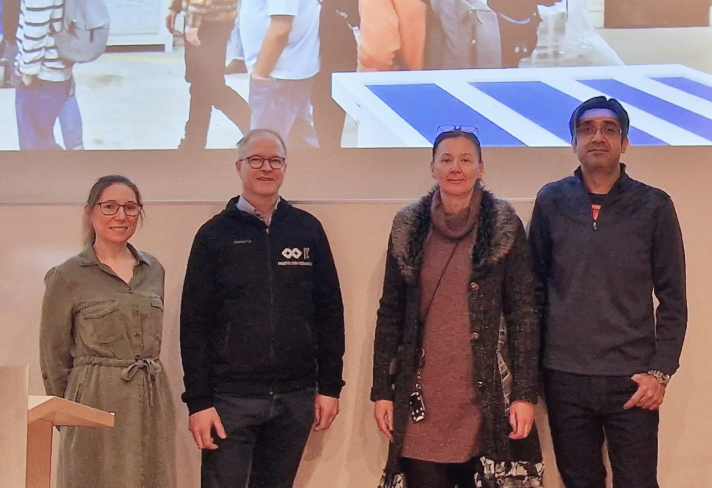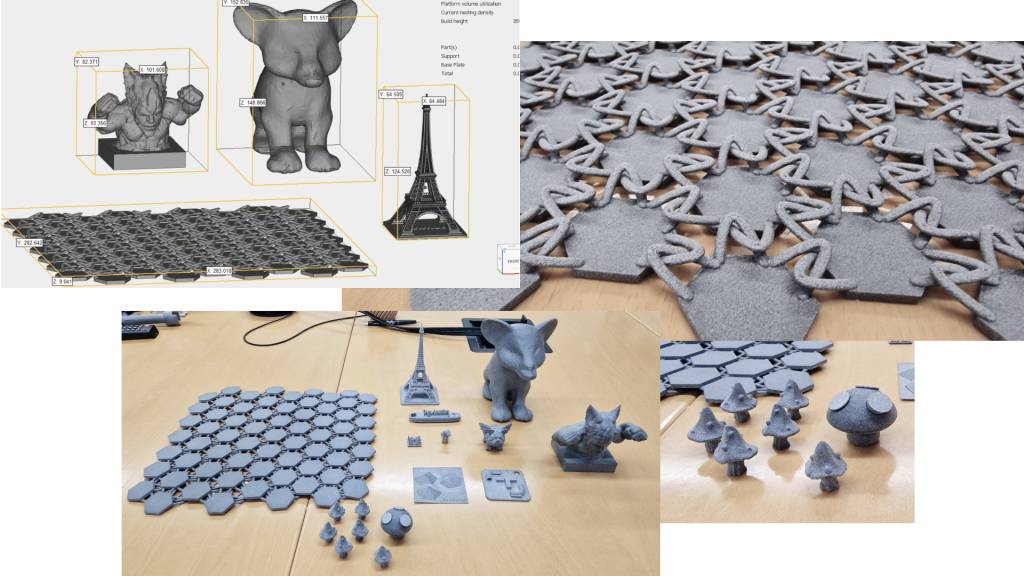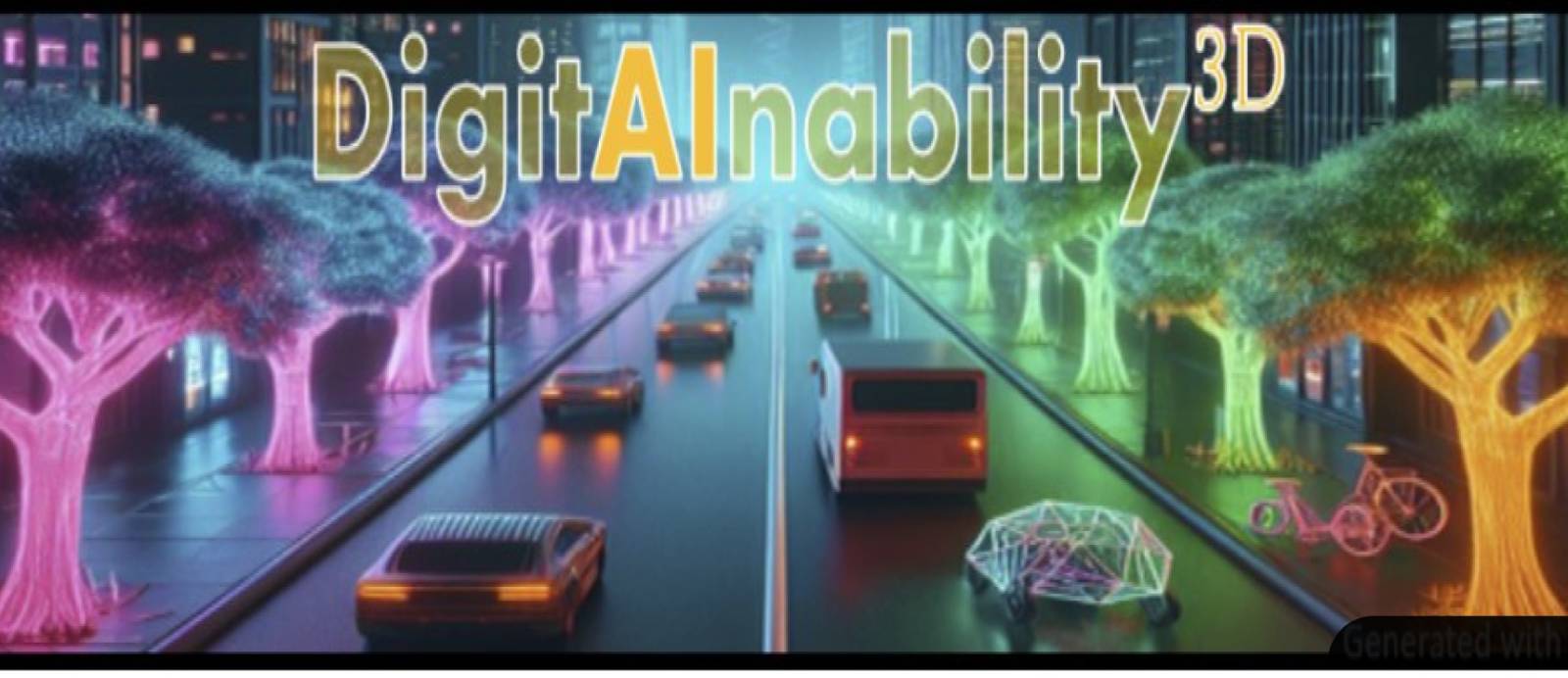Invited Talks: Bridging Disciplines
One of the most anticipated aspects of Winter School was the series of invited talks. Experts from academia and industry shared insights into the transformative potential of digitalisation, AI, and 3D printing.
- The opening talk by Kirsikka Kaipainen introduced the concept of 3D DigitAInability, examining the intersection of 3D technologies, AI, and sustainability and reflected on the future challenges and innovations that lie ahead in this emerging field.
- Pekka Ketola, a 3D printing pioneer in Finland, discussed the role of additive manufacturing in creating innovative, sustainable, and decentralised production systems.
- The shared talk by Julia Kuosmanen and Anneli Kylliäinen dealt with the important theme of social sustainability and the role novel technologies, including AI and additive manufacturing, can play in improving lives of neurodiverse populations.
- Ahmed Farooq introduced the emerging field of intelligent haptic mediation, explaining how it aligns with other novel technologies and AI, and how it is used to design tools and experiences replicating a holistic multimodal experience on mobile and handheld devices.
- Representatives of the City of Tampere, Aleksi Kopponen, Laura Inha, Sanna Mari Huikuri and Kaisa Mustajärvi, explored the key elements of regenerative smart cities. Their presentation emphasised human-centric design, ecological sustainability, and the integration of advanced technologies to improve urban living.
- Pekka Abrahamsson explored the potential of fully autonomous AI systems to drive sustainability by enhancing efficiency and decision-making in areas like climate response and resource management.
- Aygün Varol discussed the evolution of smart spaces: how cutting-edge AI models such as transformer networks are transforming traditional IoT applications, enabling smarter and more adaptive environments.
- The final talk by Iñigo Flores Ituarte examined how AI and additive manufacturing can advance sustainable engineering design, highlighting the strategies for reducing waste and energy consumption while optimising performance and contributing to a more sustainable future.
These talks at Winter School on 3D DigitAInability not only highlighted the latest technological advancements but also emphasised the importance of cross-disciplinary collaboration in tackling sustainability challenges. Participants were encouraged to think beyond their own fields, recognising that solutions require diverse perspectives and expertise. One participant reflected: “One thing I appreciated about the school was the variety of perspectives brought into the discussions. […] To me, these seemingly distinct topics seamlessly fit together, weaving a narrative about how interconnected our challenges – but also solutions – really are.”

Demonstrations That Sparked Curiosity
Winter School also featured live demonstrations of technologies that are reshaping industries. Among the most popular were the hands-on showcases of AI-powered design tools and innovative 3D printing methods at 3DStep. These demonstrations offered a unique opportunity to see theory in action. For many attendees, this was their first exposure to how digital and physical technologies converge to create sustainable solutions.

Interactive Design Sessions: From Concept to Creation
The interactive sessions were where Winter School truly came to life. Guided by expert facilitators, participants formed small teams to conceptualise and design objects that addressed specific sustainability challenges ranging from the idea of 3D manufacturing smart shoe insoles towards solutions designed to enhance urban air quality and building aesthetics. Using digital design tools, participants further transformed their ideas into printable models and had fun playing with different 3D design technologies.
Printing Dreams into Reality
The moment of truth for many participants came during the 3D printing sessions, where they saw their designs materialise. Watching their concepts take physical form was both thrilling and rewarding. It was a tangible reminder of the power of technology to bring ideas to life.
For participants, this hands-on experience underscored the importance of iterative design and problem-solving. It also highlighted the environmental advantages of 3D printing, such as reduced material waste and localized production.

Community and Collaboration
Beyond the technical content, the winter school served as a platform for building lasting connections. Participants shared ideas, collaborated on projects, and exchanged cultural and professional experiences. Networking events and informal discussions fostered a sense of community that extended beyond the workshop.
Looking Ahead: Inspiration and Impact
Winter School concluded with a showcase of participant projects, where teams presented their designs and shared the challenges they overcame. The event demonstrated not only the participants’ creativity and technical skills but also their commitment to sustainability. One participant noted: “3D printing and sustainability make more sense to me now: initially, I had only considered 3D printing from a hobby perspective, rather than as a way to repair, making missing pieces, or redesign parts previously manufactured through other manufacturing methods. This insight is something that I will continue to think about.”
Many participants left with new ideas for integrating digitalization and 3D printing into their prospective pursuits. Organizers expressed hope that Winter School would act as a catalyst, inspiring attendees to become ambassadors for sustainable innovation in their respective fields.
The 1st Winter School on 3D DigitAInability was a remarkable convergence of technology, creativity, and purpose. It underscored the potential of these fields to drive meaningful change and inspired participants to continue exploring their intersections. As the world faces urgent sustainability challenges, initiatives like Winter School play a crucial role in equipping future leaders with the tools and mindset needed to create a more sustainable and equitable future. With its blend of education, collaboration, and hands-on innovation, Winter School was not just an event – it was a step toward a brighter, more sustainable world.
The Winter School was co-organized by TAUCHI Research Center – Tampere Unit for Computer-Human Interaction, Tampere University and 3DStep with support by DigiSus Research Platform seed funding.

About the organizers:
Julia Kuosmanen, Senior Research Fellow at the Tampere IAS and the Faculty of Information Technology and Communication Sciences, Tampere University
https://www.tuni.fi/en/julia-kuosmanen
https://www.linkedin.com/in/julia-kuosmanen-2996b37/
Julia obtained her PhD in Interactive Technology from the University of Tampere in 2009. Her research interests include vision-based perceptual user interfaces, human-computer interaction, child-computer interaction, computer vision, pattern recognition, signal processing, and eye tracking.
Ahmed Farooq, Project Lead, Intelligent Haptic Mediation in Mobile Devices (IHM) Tampere Unit of Computer Human Interaction, Tampere University
https://www.tuni.fi/en/ahmed-farooq
Ahmed has been developing various research projects at the TAUCHI Research Center, since 2011. He has a Master’s in CS (TAU), a Ph.D. in Interactive Technologies (TAU) and a Postdoc in EE / CE (from PURDUE, USA). Currently he is working with multiple international to leverage AI /ML enhancing academic and industrial research on Multimodal Interaction.
Vera Remizova, Doctoral Researcher, Faculty of Information Technology and Communication Sciences, Tampere University
https://www.linkedin.com/in/veraremizova/
Vera is a user experience researcher, interaction designer, and Ph.D. candidate in Interactive Technologies at Tampere University. She has been a member of the Research Group for Emotions, Sociality, and Computing since 2015. Her research interests include novel user experience design, gesture interaction, multimodal interfaces and child-computer interaction.
Pekka Ketola, Chief innovation officer, founder, 3DStep Oy
https://www.linkedin.com/in/pekkaketola/.
Pekka is a professional innovator. He has worked with emerging technologies at Nokia corporation (17 years) and as entrepreneur (12 years). Pekka is a founder at 3D printing company 3DStep Oy, innovation company Ideascout Oy and vehicle manufacturing company Scouter Mobility Oy. He has a PhD from Tampere university (user centred development).
Blogpost main image was generated with AI April 30th 2024.

